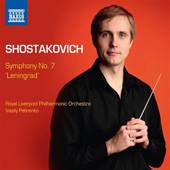

In the highly anticipated next installment of their acclaimed Shostakovich cycle, Vasily Petrenko and the Royal Liverpool Philharmonic take on the Leningrad Symphony. Few symphonies written in modern times have attracted the
degree of extra-musical speculation accorded this work; the first three movements of which were written during the initial months of the siege of Leningrad in 1941. The symphony became an immediate worldwide symbol of the
opposition to the tyranny of Hitler, though its inspiration may have stemmed as much from Stalin's atrocities during the 1930s as from the brutalities of the Nazi invasion. This epically-proportioned symphony stands as a testament to
heroism and human endurance at a time of overwhelming conflict and deprivation. {Naxos}
Many of the best conductors have had a go at this, the Symphony No. 7 'Leningrad', Op. 60 by Dmitri Shostakovich, in my opinion the best symphonic statement of the 20th century,
and most of them have come to it from different angles. Some have stressed its emotional weight (Bernstein), some have spotlit its political sous-entendu (Rostropovich), some have focused on its military symbolism and
nothing else, and some have completely missed the mark. Conductor Vasily Petrenko, No. 8 reviewed here and No. 11 reviewed here
now well into his complete cycle of all the Shostakovich symphonies, comes to it from a thoroughly musical standpoint.
As the old saying states that strife and despair motivate and inspire artists to create great works, this symphony is a case in point. It is filled, from start to finish, with some of this composer's best material. Petrenko keeps a firm grip on
the musical narrative at all times, so much so that we never lose track of the unfolding story. Even the second subjects, counter motifs, and ideas tossed around within the orchestral fabric are always clearly audible, and therefore
influence our perception of this work. This is most evident during the expertly paced and highly expressive slow movement. The live Bernstein Chicago recording remains, in my opinion, the standard to surpass, and I could go on for
pages here comparing the two because quite a few of their differences are glaring, but I always prefer to judge a new recording on its own merits. Just to give you an example, Bernstein's first movement introduction is bold, proud and
sharp-edged, while Petrenko's is warm, noble and broad. And then both conductors follow diverging paths from these individual starting points. I must admit that Bernstein's brutal savagery underpinning the German invasion of
Leningrad is something to behold, and even though Petrenko and the Liverpool Orchestra members drive smaller tanks than their Chicago counterparts, they still manage to fire a few heavy shells and shake the ground here and there. The ever
expanding military march theme - somewhat like an adult version of the children's round "Malbrough s'en va-t-en guerre" - is kept focused and determined under Petrenko. Everything about this reading is tight and cohesive, and avoids the
overly expansive trap that Bernstein falls into during the final moments of the last movement.
The recording quality is superb, with a wide dynamic range that does full justice to everything from a lone distant flute to a full battalion of percussion instruments. The strings in particular are very well captured, projecting an
aggressive bite when called for. Highly recommended!
Jean-Yves Duperron - July 2013